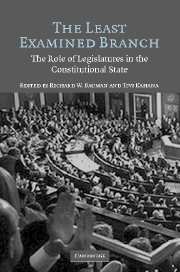Book contents
- Frontmatter
- Contents
- Foreword: Legislatures in the Constitutional State by Amy Gutmann
- Contributors
- New Ways of Looking at Old Institutions
- PART ONE LEGISLATURES AND DEMOCRATIC THEORY
- PART TWO LEGISLATING AND DELIBERATING IN THE DEMOCRATIC LEGISLATURE
- PART THREE CONSTITUTION MAKING BY LEGISLATURES: THE EXPLICIT VERSION
- PART FOUR CONSTITUTION MAKING BY LEGISLATURES: THE IMPLICIT VERSION
- 13 What Do Constitutions Do That Statutes Don't (Legally Speaking)?
- 14 Conditions for Framework Legislation
- 15 Super-Statutes: The New American Constitutionalism
- PART FIVE CONSTITUTIONAL INTERPRETATION AND APPLICATION BY THE LEGISLATURE
- PART SIX IS LEGISLATIVE CONSTITUTIONALISM POSSIBLE?
- PART SEVEN THE LEGISLATURE IN DIALOGUE: DOMESTIC AND INTERNATIONAL CONTEXTS
- Index
14 - Conditions for Framework Legislation
Published online by Cambridge University Press: 06 August 2009
- Frontmatter
- Contents
- Foreword: Legislatures in the Constitutional State by Amy Gutmann
- Contributors
- New Ways of Looking at Old Institutions
- PART ONE LEGISLATURES AND DEMOCRATIC THEORY
- PART TWO LEGISLATING AND DELIBERATING IN THE DEMOCRATIC LEGISLATURE
- PART THREE CONSTITUTION MAKING BY LEGISLATURES: THE EXPLICIT VERSION
- PART FOUR CONSTITUTION MAKING BY LEGISLATURES: THE IMPLICIT VERSION
- 13 What Do Constitutions Do That Statutes Don't (Legally Speaking)?
- 14 Conditions for Framework Legislation
- 15 Super-Statutes: The New American Constitutionalism
- PART FIVE CONSTITUTIONAL INTERPRETATION AND APPLICATION BY THE LEGISLATURE
- PART SIX IS LEGISLATIVE CONSTITUTIONALISM POSSIBLE?
- PART SEVEN THE LEGISLATURE IN DIALOGUE: DOMESTIC AND INTERNATIONAL CONTEXTS
- Index
Summary
The United States Congress structures some of its deliberation and decision making through framework legislation. Framework laws establish internal procedures and rules that will shape legislative deliberation and voting with respect to a specific subset of laws or decisions in the future. They are laws about lawmaking in a particular arena. They are related to the standing rules of the House or Senate, but unlike most of these rules, they are passed in statutes rather than through concurrent or simple resolutions. Some parts of the standing rules have also been passed initially as statutes, most notably, in the Legislative Reorganization Acts of 1946 and 1970. These legislative reorganization laws are similar to framework laws in that they were first enacted in statutory form, but, unlike framework laws, their provisions changed congressional procedures and structures generally, not only for a subset of decisions. Framework laws, by contrast, supplement, and sometimes supplant, ordinary rules of procedure only for a defined set of future decisions. Although framework laws are passed in statutory form, requiring concurrence of both houses and presentment to the president, the portions of the laws that set out internal frameworks are usually identified as exercises of the two houses' constitutional rule-making powers, and the right of either house to change the framework unilaterally is, in most cases, explicitly reserved.
Framework laws are familiar, although little scholarly attention has been paid to them as a related legislative phenomenon in the United States.
- Type
- Chapter
- Information
- The Least Examined BranchThe Role of Legislatures in the Constitutional State, pp. 294 - 319Publisher: Cambridge University PressPrint publication year: 2006
- 2
- Cited by



